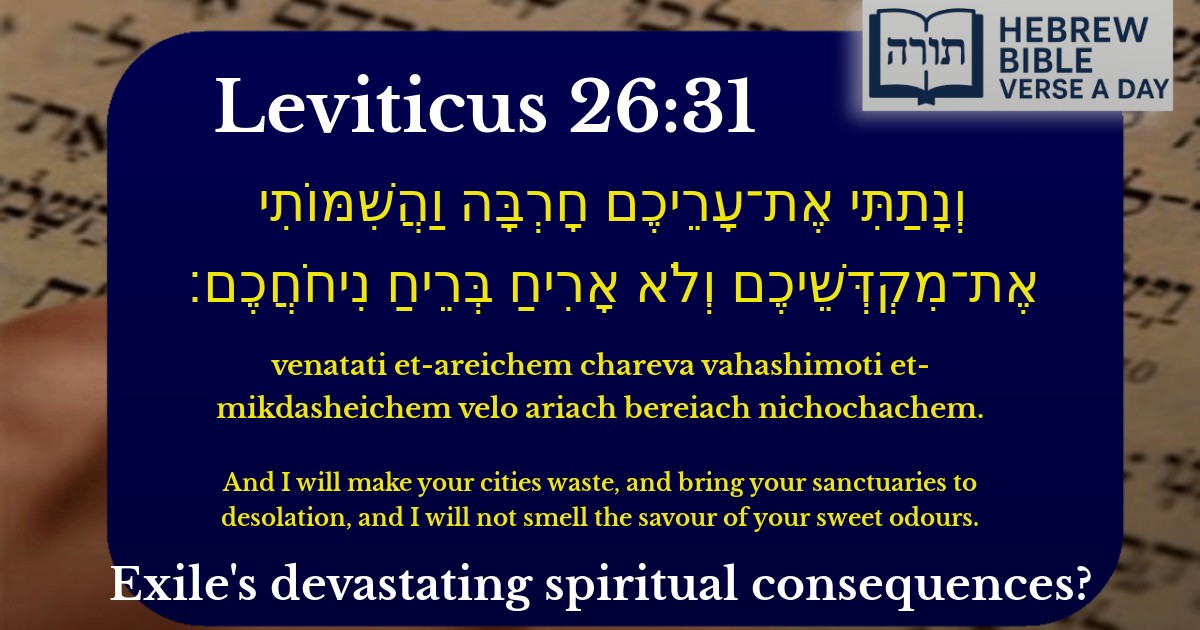Join Our Newsletter To Be Informed When New Videos Are Posted
Join the thousands of fellow Studends who rely on our videos to learn how to read the bible in Hebrew for free!
Hebrew Text
וְנָתַתִּי אֶת־עָרֵיכֶם חָרְבָּה וַהֲשִׁמּוֹתִי אֶת־מִקְדְּשֵׁיכֶם וְלֹא אָרִיחַ בְּרֵיחַ נִיחֹחֲכֶם׃
English Translation
And I will make your cities waste, and bring your sanctuaries to desolation, and I will not smell the savour of your sweet odours.
Transliteration
Venatati et-areichem chareva vahashimoti et-mikdasheichem velo ariach bereiach nichochachem.
Hebrew Leining Text
וְנָתַתִּ֤י אֶת־עָֽרֵיכֶם֙ חׇרְבָּ֔ה וַהֲשִׁמּוֹתִ֖י אֶת־מִקְדְּשֵׁיכֶ֑ם וְלֹ֣א אָרִ֔יחַ בְּרֵ֖יחַ נִיחֹֽחֲכֶֽם׃
וְנָתַתִּ֤י אֶת־עָֽרֵיכֶם֙ חׇרְבָּ֔ה וַהֲשִׁמּוֹתִ֖י אֶת־מִקְדְּשֵׁיכֶ֑ם וְלֹ֣א אָרִ֔יחַ בְּרֵ֖יחַ נִיחֹֽחֲכֶֽם׃
🎵 Listen to leining
Parasha Commentary
📚 Talmud Citations
This verse is quoted in the Talmud.
📖 Megillah 31b
The verse is cited in the context of discussing the curses in the Torah and their implications for the Jewish people.
📖 Ta'anit 4a
The verse is referenced in a discussion about the destruction of the Temple and the cessation of sacrifices.


Context in the Torah
The verse (Vayikra 26:31) appears in the Tochacha (Rebuke), a section of severe warnings for failing to observe the mitzvos. It describes the consequences of abandoning the covenant with Hashem, including the destruction of cities, desolation of sanctuaries, and rejection of korbanos (offerings).
Rashi's Explanation
Rashi explains that "your sanctuaries" refers to Batei Mikdash (Temples) where offerings were brought. The phrase "I will not smell" signifies that Hashem will not accept their korbanos, as they are offered without sincere repentance. Rashi emphasizes that even during exile, the potential for Divine mercy remains if Bnei Yisrael return to Hashem.
Rambam's Perspective
In Hilchos Teshuvah (7:7), Rambam teaches that these punishments are not vengeful but corrective—meant to inspire teshuvah. The withdrawal of Divine favor ("I will not smell") reflects the spiritual consequence of estrangement from Hashem’s will, not a permanent rejection.
Midrashic Insights
Kabbalistic Dimension
The Arizal (Shaar HaKavanos) notes that "not smelling" the offerings hints at a disruption in the flow of Divine sustenance (shefa) from higher spiritual realms, as korbanos normally elevate the physical world. Their rejection signifies a broken connection between heaven and earth.
Practical Lesson
This verse underscores that physical sanctuaries depend on spiritual integrity. The Chofetz Chaim teaches that even in exile, our "small sanctuaries" (synagogues and study halls) must be maintained with reverence to hasten the ultimate redemption and rebuilding of the Beis HaMikdash.